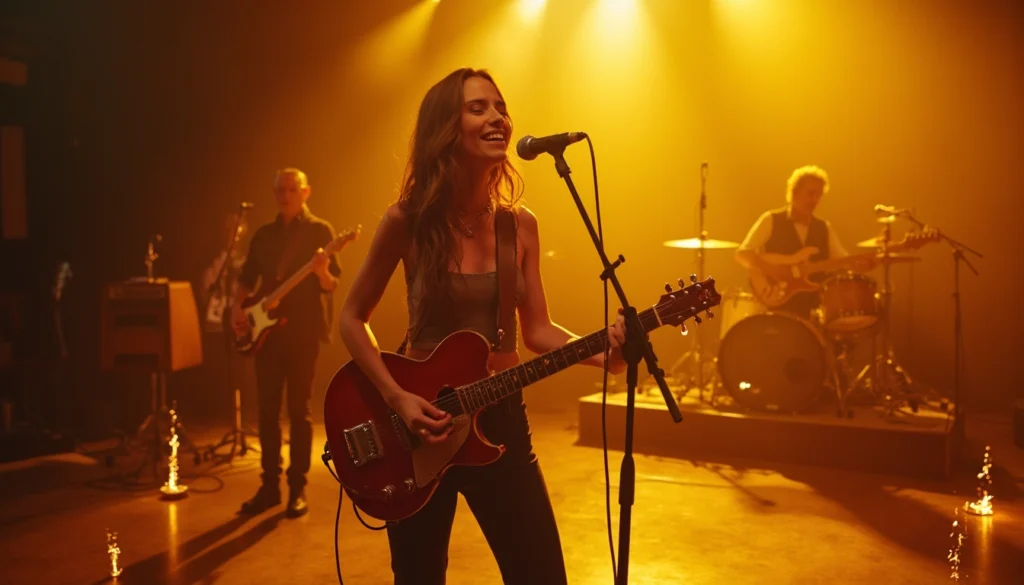Understanding Market Segmentation for Concerts

Market segmentation transforms broad marketing into precision—by understanding your audience, you can connect with the right people and drive ticket sales
Market segmentation is the process of dividing a broad audience into smaller, more specific groups based on shared characteristics like age, location, interests, or buying behavior. For concert promoters and venues, this means understanding who is most likely to buy tickets to your event and tailoring your marketing efforts to speak directly to those people.
The idea behind this is quite simple: you wouldn’t promote a punk rock concert to a classical music fanbase, and vice versa. Instead, you’d target people who have previously attended similar events or shown interest in the type of music your event is offering. By narrowing down your audience into distinct groups, you can make sure your message reaches the right people—those who are genuinely interested in attending your concert.
Why is Market Segmentation Key to Selling More Tickets?
Market segmentation allows you to create targeted marketing campaigns that resonate with specific groups, increasing the likelihood of ticket sales. Instead of a one-size-fits-all approach, you tailor your advertising messages to different audience segments, which can lead to better engagement and higher sales.
Imagine you’re promoting a concert with a diverse lineup: it’s always a good idea to create ads that speak directly to each kind of audience. Different strategies should be put in place to reach different types of fans. When promoting your concert, consider the specific elements of your event that will appeal to each audience segment. For example, if you’re promoting a family-friendly outdoor concert, your messaging should highlight the activities available for children, such as food trucks or kid-friendly spaces. Segmentation ensures that your campaign reaches the right people with the right messages, those that speak to their preferences.
3 Key Segmentation Strategies to Maximize Ticket Sales

Age, Income, Location, and Lifestyle— the ABCs of smart audience segmentation that every promoter needs to master for sold-out shows
1. Demographic Segmentation: Targeting Audiences Based on Age, Gender, and Income
Demographic segmentation involves dividing your audience based on easily identifiable factors like age, gender, and income. For example, an indie band may attract younger audiences, while an orchestral performance might be more appealing to an older demographic. By identifying these groups, you can create personalized marketing messages that resonate with each one.
One way to use demographic segmentation is by offering special premium experiences for higher-income attendees. For instance, you could offer VIP packages with extras like backstage access, meet-and-greets with the artists, or special seating with added perks like free drinks. This gives people willing to spend more something extra, and helps you increase revenue while offering a unique experience.
2. Geographic Segmentation: Reaching Audiences Based on Location
Geographic segmentation focuses on targeting audiences based on their location. For concerts, this could mean reaching out to people within driving distance of your venue. If you’re hosting a concert in a large city, you can target ads to nearby towns and communities, making it easier for people who live outside the city to attend.
Tailoring your messages to specific cities or regions is also effective. For example, if a local artist is performing, emphasize their connection to the city. Highlighting local artists or cultural elements makes your event feel more relatable and special to the people you’re trying to attract, which increases their interest in attending.
3. Psychographic Segmentation: Understanding Interests and Lifestyles
Psychographic segmentation focuses on understanding your audience’s interests, values, and lifestyles. For concerts, this could mean targeting specific music preferences, such as heavy metal fans, jazz enthusiasts, or indie music lovers. It’s also a good idea to identify unexpectedly related interests—for example, indie music fans may be drawn to events that feature artisanal food vendors or a laid-back, community vibe. Recognizing these subtle connections allows you to craft experiences and messages that resonate more deeply with your audience.
Tailor your messaging to appeal to specific hobbies or lifestyles. For instance, a fan of electronic music might also enjoy attending music festivals. By tapping into their interests and values, such as sustainability or supporting independent artists, you create a deeper connection and give them more reasons to attend your concert.
Bonus: Additional Segmentation Strategies to Supercharge Your Sales
4. Behavioral Segmentation: Focus on Engagement and Buying Behavior
Behavioral segmentation looks at how people interact with your event or marketing materials. You probably want to focus on users who have shown high engagement, such as those who have liked or commented on your social media posts or attended similar events in the past.
You can target past buyers by sending them exclusive offers, or retarget users who showed interest but didn’t complete their purchase. One way of doing this is by creating urgency-based messaging for users who have previously purchased last-minute tickets, encouraging them to act sooner by emphasizing limited availability or exclusive deals.
5. Technographic Segmentation: Tailoring Ads to Tech-Savvy Users
Technographic segmentation involves tailoring your marketing to fit the technology habits of your audience. For younger, tech-savvy concert-goers, you might want to focus on mobile-first campaigns that are optimized for quick ticket purchases. Offer ticket-buying options that integrate with mobile payment solutions like Apple Pay or Google Wallet for added convenience.
On the other hand, for older audiences who may use desktop computers more often, ensure your ads and websites are easy to navigate on a larger screen. This helps you cater to the preferred browsing habits of each segment.
6. Frequency of Attendance: Loyal Fans vs. Casual Attendees
Segment your audience based on how frequently they attend concerts. For loyal fans who frequently attend events, offer loyalty rewards, such as discounted VIP packages or pre-sale access to upcoming shows. These incentives can help strengthen the relationship between your venue and your most dedicated customers.
For casual concert-goers, use messaging that emphasizes what makes this event special or different, enticing them to attend. Highlight unique features such as special guest appearances, rare performances, or a fun, memorable experience that’s too good to miss.
7. Segmenting by Similar Events, Tribute Bands, and Related Interests
One effective way to increase ticket sales is by segmenting your audience based on their past interest in similar events or tribute bands. For example, if your venue hosted a successful indie rock concert, consider targeting attendees of that event for your next similar show or even a tribute band that plays music from the same genre. This segmentation allows you to reach audiences who are already primed to enjoy similar musical experiences.
Creative segmentation doesn’t just stop with genre or artist type; think outside the box by looking at thematic connections. If an upcoming concert features a popular ‘80s rock band, target fans who attended similar ‘80s-themed events or even classic movie nights showcasing that era. By tapping into shared cultural and thematic interests, you can create campaigns that resonate with niche groups who might otherwise miss the event, making them more likely to grab tickets and share the excitement with others.
Want to learn more on how to build hype for your event? Check our article on reasons why pre-event engagement may be low—and how to fix it.
What To Do Next: Optimizing Your Advertising Efforts with Market Segmentation

When you know exactly who your audience is, you can speak their language.
Creating Attendee Personas: Craft Detailed Buyer Profiles
Creating attendee personas involves building detailed profiles of your potential concert-goers based on their interests, behaviors, and motivations. These personas are fictional representations of your ideal customers, helping you better understand what drives each segment to attend your event. For example, you might combine interests like music genres, spending habits, and event preferences to create profiles such as “Festival Enthusiasts,” who enjoy multi-day music events with various performers, or “Local Concert-Goers,” who prioritize nearby, affordable concerts for a casual night out.
These combined qualities allow you to develop highly targeted ad campaigns that appeal to the unique preferences of each persona. In order to make the most out of each segment, you might offer premium experiences to high-spending festival-goers while offering discounted early-bird tickets to casual local fans. Tailoring your messaging to reflect the specific desires of each persona ensures your ads resonate deeply with potential attendees, increasing engagement and driving more ticket sales.
Tailoring Your Ad Spend for Each Segment
To make the most of your ad budget, focus on segments that are proven to convert—these are groups that consistently engage with your ads and are more likely to buy tickets. For instance, frequent concert-goers or highly engaged fans on social media tend to be more responsive to your marketing efforts. Investing more in reaching these audiences increases the likelihood of ticket sales, giving you a better return on your advertising dollars.
On the other hand, lower-performing segments are groups that may not engage with your ads or buy tickets as frequently. Take casual listeners or people in distant locations that might show less interest in attending your event. In this case, you could either reduce the ad spend allocated to these groups or tweak your messaging to make it more appealing—perhaps highlighting local aspects of the event or offering special features to grab their attention. By adjusting your strategy based on performance, you’ll use your budget more efficiently and get better results.
Improving Ad Messaging for Specific Groups
Tailoring your ad copy to reflect the values and interests of each audience segment means crafting your message to resonate with the unique preferences, desires, and motivations of different groups. Consider how some audiences may be drawn to the thrill of a lively concert experience, while others may prioritize comfort, ease, or a specific type of performance. Understanding these distinctions allows you to design ad copy that speaks to the heart of each group, increasing the likelihood of capturing their interest and driving ticket sales.
For example, to speak to younger audiences, who might be more interested in the social and energetic aspects of the event, your messaging could emphasize the festival vibe, party atmosphere, or the chance to hang out with friends while enjoying live music. Use fun, casual language and highlight things like special photo opportunities, after-parties, or influencer appearances to build excitement. For older audiences, the focus might shift to the quality of the performance or the comfort of the venue—mention things like premium seating, excellent acoustics, or the ability to enjoy the concert in a more relaxed environment. By personalizing your message in this way, you can make your ads more appealing and relevant, helping to ensure each group sees the value in attending your event.
Looking to dive deeper into how targeted online ads can boost your ticket sales? Check out our detailed guide on maximizing ticket sales with targeted online ads. Get expert tips and strategies to make your next campaign a success!
Unlock the Power of Segmentation to Supercharge Your Concert Sales
As you’ve probably realized by now, market segmentation is a powerful tool for concert promoters and venues to optimize ticket sales. Remember: by understanding your audience and tailoring your marketing strategies to appeal to specific segments, you can boost engagement and increase conversions. Whether through basic demographic, geographic, or psychographic segmentation, or other creative techniques, reaching the right people with the right message will lead to higher ticket sales and a successful event.
Ready to fine-tune your concert marketing with effective segmentation? Contact us to learn more about how we can help you increase ticket sales and reach your ideal audience.





